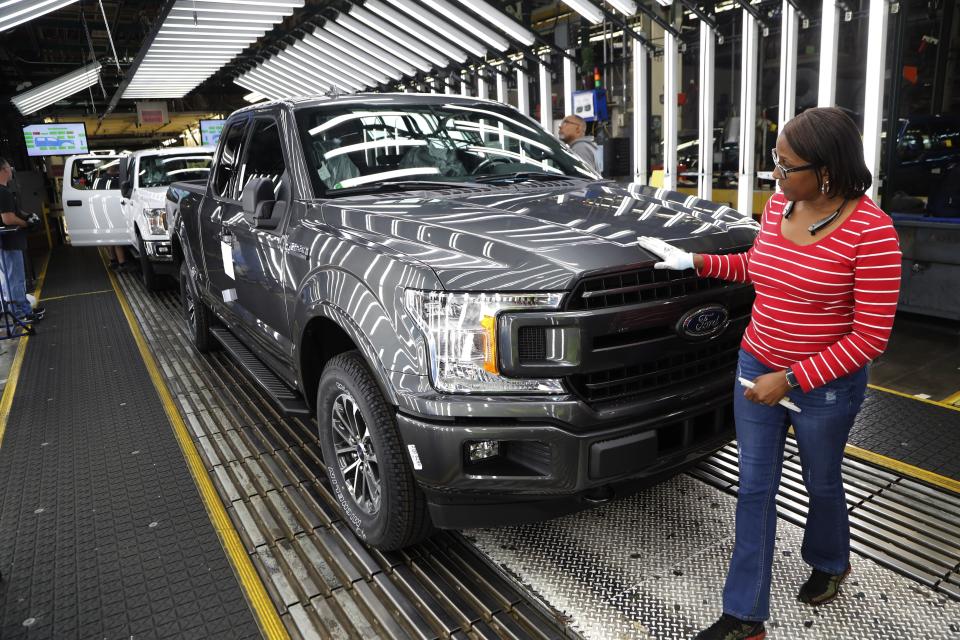Trump’s war with carmakers is crazy
President Trump has mounted a deregulatory crusade, vowing to slash rules and regulations that get in the way of doing business.
Unless you disagree with him. Then he’ll use the full heft of the federal government to jam your operations.
Trump thought he’d win accolades from automakers like General Motors and Ford by rolling back stringent fuel-economy standards President Obama put in place. Apparently he never asked the automakers about that. Because Trump is now learning the car industry doesn’t exactly want the gifts he’s offering.
Trump’s fuel-economy rollback has created a giant rift with California and a dozen other states, which for years had standards stricter than the federal rules, because of localized pollution problems. Trump is now attempting to revoke California’s right to set its own rules, which is bound to become yet another Trumpworld legal morass that could take years to sort out.
This shouldn’t be happening, but it’s worth trying to follow along why it is. Because of smog in southern California, the state imposed the nation’s first tailpipe emission standards in 1966. The federal Clean Air Act of 1970 gave Washington the authority to regulate pollution from cars nationwide. But since California was already doing that, the law allowed California to set its own rules, as long they met or exceeded federal ones.
Ever since, California has received waivers from the Environmental Protection Agency allowing it to set its own fuel-economy standards. Over time, a dozen other states adopted California’s higher standards, which now govern about 33% of the U.S. car market.
[See why the GM strike won’t revive unions.]
It generally costs automakers more to build cars that meet the higher standards, but there’s an offsetting factor: They don’t want to build two sets of cars for two different pollution regimes. President Obama ratcheted up the federal fuel-economy standards in 2012, setting tough new targets for automakers to meet. They agreed for a few reasons. One, the new federal rules would be harmonized with California’s, effectively setting one national standard instead of two. Another reason: There would be interim reviews allowing for changes in the new rules if needed technology developments weren’t coming fast enough.

Drastic rollbacks from Obama-era standards
At the tail end of the Obama presidency, in early 2017, the government finalized the new rules without an interim review automakers expected. California did the same. That irked carmakers, who then appealed to Trump for relief. What they didn’t expect was a rollback under Trump so drastic that it created a fresh schism with California, which is sticking with the Obama-era targets. If the Trump and California rules both survive, there will be two national standards again starting in 2021, when the Trump rollbacks go into effect.
Four automakers—BMW, Ford, Honda and Volkswagen—recently made a deal with California to meet pollution rules that are a bit more permissive than the Obama standards, but much stricter than Trump’s. Other automakers, including GM, would probably be happy to do the same, but are wary of provoking Trump.
Such caution is prudent. On Sept. 18, Trump directed the government to revoke California’s waiver, setting in motion a certain legal battle. The law says the EPA can either grant or deny a waiver to California. It doesn’t say the feds can revoke a waiver that’s already been issued. The current waiver, issued by the Obama administration, runs through 2025.
Forcing car makers to build to lower standards
On top of that, the Trump Justice Department, obviously channeling Trump’s personal rage, has launched a dubious antitrust investigation of the four automakers that agreed to abide by the California standards. Normally, the kind of anticompetitive behavior that triggers antitrust action involves companies colluding to drive up prices or harm consumers in some blatant way. That’s not an issue here. Trump’s antitrust goons are going after four auto companies for setting emissions standards higher than Trump wants them to.
If Trump were pro-business, as he claims to be, he’d let automakers decide for themselves what kinds of cars to build, instead of trying to force them to build to his lower standards. What Trump doesn’t account for—or simply doesn’t care about—is the global nature of the auto business, and the need for all automakers to build common systems they can sell in as many markets as possible, including Europe, China and other places where emission standards are also going up. The CEOs of GM and Ford and Toyota and Honda know way better than Trump how to run their businesses.
The sham pro-business president is also forcing tariffs on thousands of American importers, driving up their costs and killing 300,000 jobs, so far. His reckless trade war is punishing American farmers losing access to foreign markets. He regularly attacks marquee U.S. companies like Amazon, Google, AT&T and others for capricious, personal reasons having nothing to do with sound economic policy. And he routinely lambastes the Federal Reserve, which is the most important stabilizing force in the U.S. economy.
The next time Trump claims to be a pro-business president, listeners should translate: What he really means is he is a pro-Trump president. Business is secondary, at best.
Rick Newman is the author of four books, including “Rebounders: How Winners Pivot from Setback to Success.” Follow him on Twitter: @rickjnewman. Confidential tip line: rickjnewman@yahoo.com. Encrypted communication available. Click here to get Rick’s stories by email.
Read more:
The rich should get ready for Warren’s wealth tax
Trump’s trade war has killed 300,000 job
Democrats are attacking the wrong companies
Trump’s biggest gamble yet: tax hikes before an election
Obama was better for your 401(k) than Trump has been
Read the latest financial and business news from Yahoo Finance
Follow Yahoo Finance on Twitter, Facebook, Instagram, Flipboard, SmartNews, LinkedIn, YouTube, and reddit.

 Yahoo Finance
Yahoo Finance 
